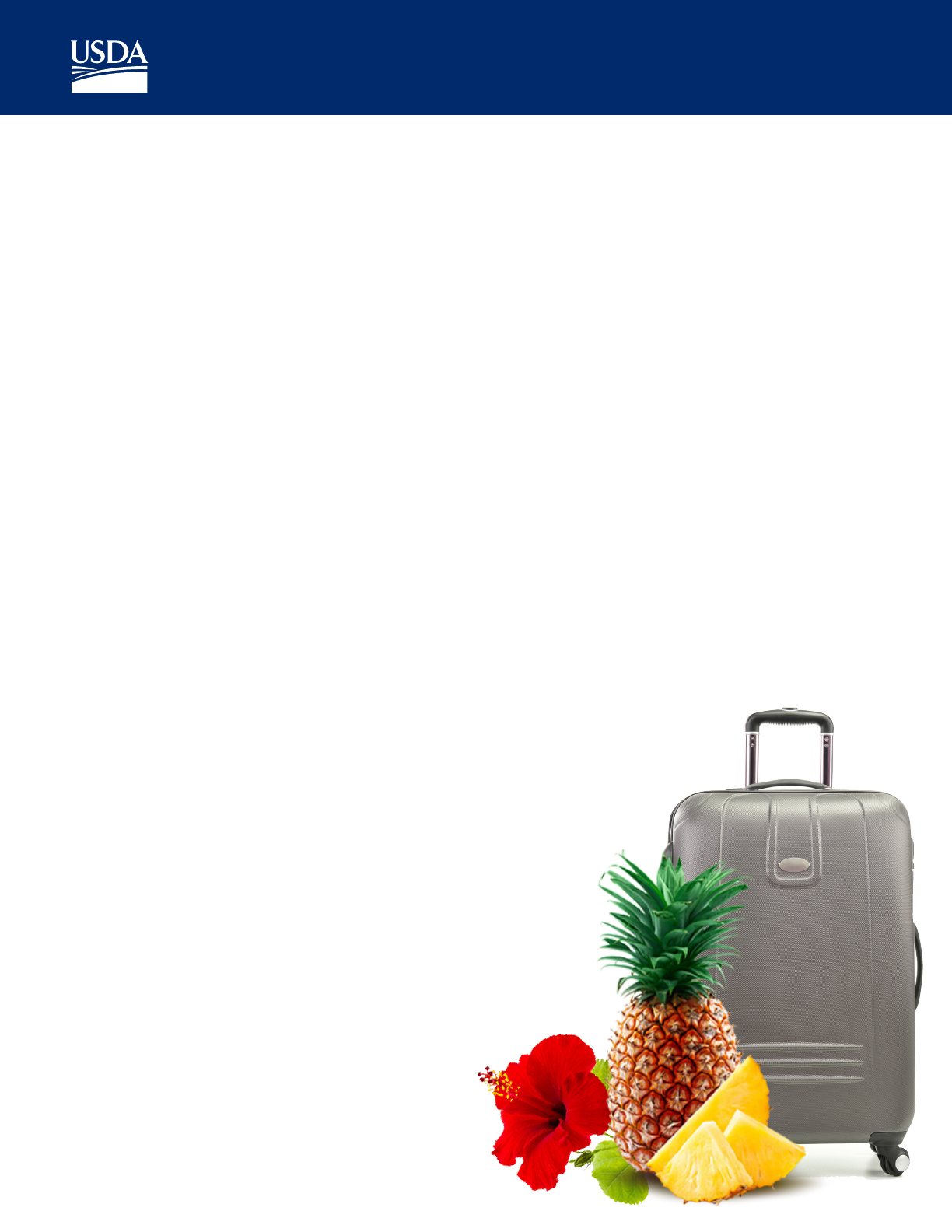
Baggage Inspection Required for Travelers Going From
Hawaii to the U.S. Mainland, Alaska, and Guam
Animal and Plant Health Inspection Service
Plant Protection and Quarantine
United States Department of Agriculture
The U.S. Department of Agriculture’s (USDA) Animal
and Plant Health Inspection Service (APHIS) prohibits
or restricts the movement of many agricultural products
from Hawaii into the U.S. mainland, including most
fresh fruits and vegetables and certain types of plants
and owers. That’s because these items could harbor
a dangerous stowaway—an invasive pest or disease.
Just one piece of fruit or a single plant that is carrying an
invasive pest or disease could cause millions of dollars
in damage and lead to expensive eradication efforts, lost
trade revenue, and higher food prices.
To prevent the spread of invasive pests and diseases,
APHIS inspects all passenger bags moving from Hawaii
to the U.S. mainland, Alaska, and Guam. APHIS ofcials
perform the inspection at the airport prior to your
departure.
Please be prepared to open and close your own
bags. Do not tape coolers and boxes closed until after
inspection. If you have any fresh fruits or vegetables,
plants, owers, souvenirs made from plants or wood,
or other agricultural products with you, please tell the
inspector. Failure to declare these items can result in
delays and possible issuance of civil penalties ranging
from $100 to $1,000 per violation.
If you wish to ship or mail agricultural items to the U.S.
mainland and Alaska, they must be inspected and/or
certied by APHIS before you take them to an airline
cargo ofce, the post ofce, or other courier service.
Fresh Fruits and Vegetables
Shipping or mailing most fresh fruits and vegetables
from Hawaii directly or through Alaska or Guam to the
continental United States is prohibited due to the risk of
introducing certain invasive plant pests and diseases.
However, there are a few exceptions. Fresh pineapple
and coconut are permitted after inspection. Fresh
papaya, abiu, atemoya, banana, curry leaf, dragon fruit,
longan, lychee, mangosteen, rambutan, starfruit, and
sweet potato are permitted, but must be treated at a
USDA-approved facility and packed in boxes that are
properly marked and stamped.
Shipping or mailing processed fruits and vegetables is
allowed. Processing methods include cooking, drying,
or freezing. If freezing, all fruits must be frozen solid at
the time of inspection. Frozen mango must be without
seeds.
Please contact APHIS for more information about
approved processing methods. Telephone numbers for
local APHIS ofces in Hawaii are provided on the next
page.
Common Items From Hawaii Allowed into
the U.S. Mainland, Alaska, and Guam After
Inspection
n Beach sand
n Coconuts
n Commercially canned foods
n Dried seeds and decorative arrangements
n Fresh owers, leis, and foliage
(except any citrus or citrus-
related owers, leaves, or other
plant parts, as well as jade
vine or Mauna Loa)

n Hinahina (Spanish moss)
n Irish or white potatoes
n Fresh pineapple
n Treated fruit, such as papaya, abiu, atemoya,
banana, curry leaf, dragon fruit, longan, lychee,
mangosteen, rambutan, starfruit, and sweet potato
1
n Plants and cuttings
2
n Rocks and stones
n Seashells, not land snail shells
n Seed leis and seed jewelry
n Wood (including driftwood and sticks) and wood
roses (dried)
Additional Items From Hawaii Allowed
into Guam
n Beets
n Rutabagas
n Turnips (without tops)
Additional Items From Hawaii Allowed into
Alaska (but may not be re-transported to the
contiguous United States)
n Chayote
n Green banana
n Green onion
n Lima bean
n Okra
n Pea
n Pumpkin
n Snow pea
n String bean
n Watermelon
n Winged bean
n Winter melon
n Yard long bean
n Zucchini
Common Items From Hawaii Not Allowed into
the U.S. Mainland and Alaska
n Fresh fruits and vegetables, except for those listed as
permitted
n Berries of any kind, including fresh coffee berries and
sea grapes
n Cactus plants or cactus plant parts
n Cotton plant parts, including cotton bolls
n Fresh owers of jade vine and Mauna Loa
n Kikania and fresh screwpine (pandanus) fruit
n Live insects and snails
n Seeds with fruit clinging and fresh seed pods
n Soil or any plants in soil
n Sugarcane
n Swamp cabbage (unchoy)
n Sweet potato (raw)
n Mock orange
This information is subject to change. For the most up-
to-date information, contact your local APHIS ofce:
Honolulu (808) 834-3220
Kona (808) 326-1252
Kauai (808) 632-2511
Hilo (808) 933-6930
Maui (808) 877-5261
For information on how to certify plants and cuttings,
contact the Hawaii Department of Agriculture:
Honolulu (808) 832-0566
Hilo (808) 974-4141
Kauai (808) 241-7135
Maui (808) 872-3848
Kona (808) 326-1077
For more information, please visit APHIS’ website at
www.aphis.usda.gov/travel.
USDA is an equal opportunity provider, employer, and lender. Issued July 2017
PPQ-20-003 Slightly revised February 2020
1
These fruits must be treated at a USDA-approved facility and
packed in boxes that are properly marked and stamped.
2
For certifying rooted plant material, contact the Hawaii Department
of Agriculture.
